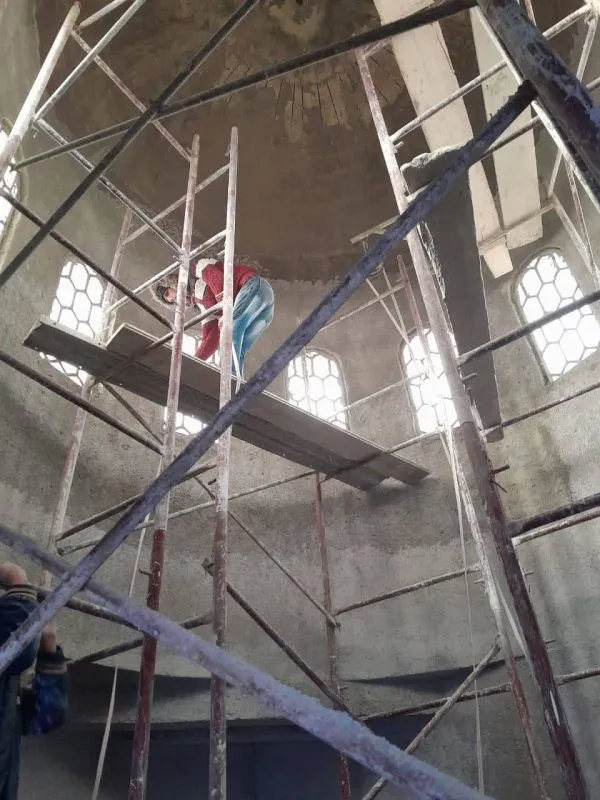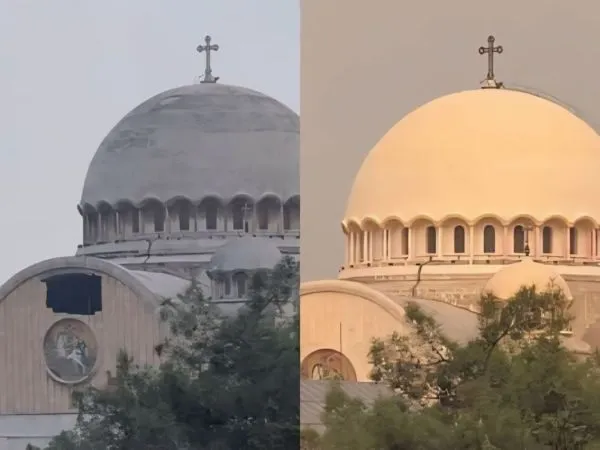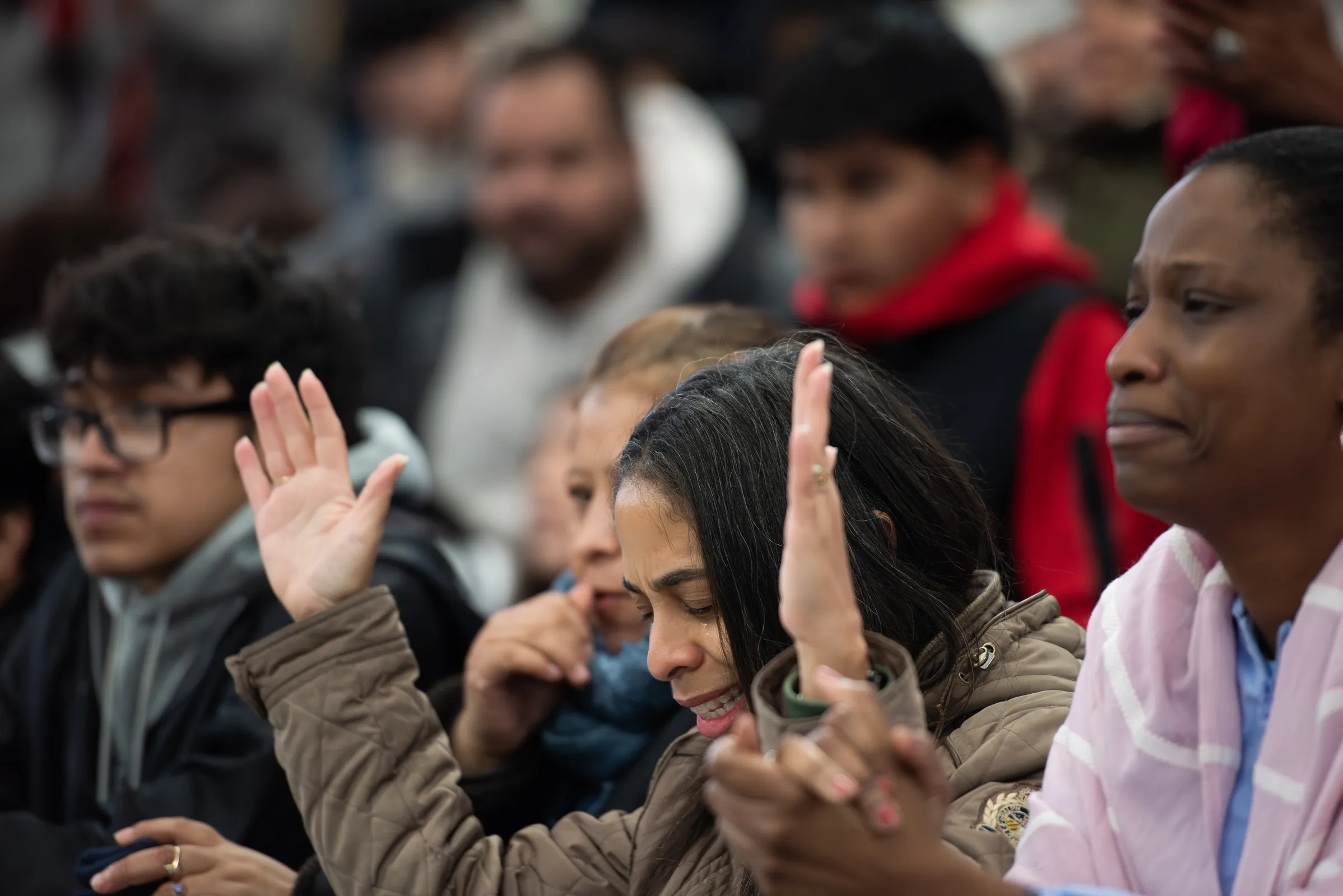Browsing News Entries
A year after earthquake, Aleppo’s St. George Church rises again
Posted on 04/23/2024 18:15 PM (CNA Daily News)
 Over a year after the earthquake that hit Syria and Turkey in February 2023, restoration of Aleppo's Church of St. George has been completed. / Credit: Abdul Kareem Daniel
Over a year after the earthquake that hit Syria and Turkey in February 2023, restoration of Aleppo's Church of St. George has been completed. / Credit: Abdul Kareem Daniel
Aleppo, Syria, Apr 23, 2024 / 14:15 pm (CNA).
This year’s feast of St. George was a particularly joyful one in the Syrian city of Aleppo, especially for the Melkite Greek Catholic community.
The church is reopening its doors after undergoing restoration due to damage from a February 2023 earthquake. Additionally, Archbishop George Masri of the Melkite Archdiocese of Aleppo and its environs will celebrate his golden jubilee.
The celebrations took place during the visit of Patriarch Joseph Absi, the current patriarch of the Melkite Greek Catholic Church, who presided over the Divine Liturgy in the restored church on the evening of April 23. The evening before, there was a procession along Holy Bible Street followed by vespers.

In an exclusive interview with ACI Mena, CNA’s Arabic-language news partner, Father Fadi Najjar, principal of Providence Private School, which is adjacent to and belongs to the church, explained that last year’s earthquake caused cracks in the church walls on both the right and left sides, allowing rainwater to leak inside. The exterior facade was also shattered, with falling stones damaging the stairs.
“The first step was removing the loose stones from above to protect people, especially since the church hall had sheltered the displaced for over a month, providing meals,” Najjar explained. “The restoration then began, taking about a year under Archbishop Masri’s direct supervision. The cracks were sealed, the exterior facade restored, the interior repainted, the stone polished, and new stairs built.”
Regarding Providence School, Najjar said that classroom walls had also cracked while sanitation systems were damaged. “We didn’t just restore the school. Rather, we began a complete renovation, taking advantage of the summer vacation. In five months, the building rose beautifully from the ashes,” he explained.
“New classrooms are being opened, the language lab revived, bathrooms added, as well as a TV/cinema hall, playroom, and aerobics studio. About 150 seats will be restored, walls repainted, floors polished, and stonework whitened — all thanks to funding from the Salla charity. Aid to the Church in Need covered the church’s restoration costs,” he added.

Najjar revealed that Masri strongly supported the school’s renovation, expressing deep appreciation for the contractor, engineer Joseph Nono, who was entrusted with both the church and school projects.
Notably, Absi’s Aleppo visit included stops at the Dar Al-Nahda Music Institute under artist Shady Najjar’s direction and a dinner for men and women named after St. George born between 1960 and 1980. He has also planned a tour of Aleppo’s Old Square.
This article was originally published in ACI Mena, CNA's Arabic-language news partner, and has been translated and adapted by CNA.
Archbishop Wenski: Deportations to Haiti 'unconscionable' amid violence, instability
Posted on 04/23/2024 18:12 PM (National Catholic Reporter)
Passions flare as Supreme Court hears case with major impact on homelessness policy
Posted on 04/23/2024 17:58 PM (National Catholic Reporter)
‘An unprecedented opportunity’: Augustine Institute announces move to St. Louis
Posted on 04/23/2024 17:30 PM (CNA Daily News)
 The Augustine Institute's new facilities in Florissant, Missouri. / Credit: Boeing Company and Augustine Institute
The Augustine Institute's new facilities in Florissant, Missouri. / Credit: Boeing Company and Augustine Institute
CNA Staff, Apr 23, 2024 / 13:30 pm (CNA).
The Augustine Institute, a Catholic educational and evangelization apostolate based in Denver for nearly two decades, announced on Tuesday that it will be moving its operations to a new campus in the Archdiocese of St. Louis.
The institute, founded in 2005 as a Catholic graduate theology school, currently has an enrollment of 550 students. It says on its website that it exists to serve “the formation of Catholics for the new evangelization” by “equip[ping] Catholics intellectually, spiritually, and pastorally to renew the Church and transform the world for Christ.”
The organization announced on Tuesday that it had purchased the former Boeing Leadership Center in Florissant, Missouri, just outside of downtown St. Louis. The school will “begin transitioning its operations over the next few years,” it said in a press release.
The nearly 300-acre property “offers an unprecedented opportunity to expand our Graduate School of Theology and further our mission to help Catholics understand, live, and share their faith,” institute President Tim Gray said in a Tuesday press release.
The Boeing facility, a former retreat center that went on sale in March, offers “state-of-the-art facilities” for the group’s Catholic mission, Gray said.
The president told CNA this week that the Augustine Institute “wasn’t even in a search mode” when they learned of the facility.
“Some of the leadership at the Archdiocese of St. Louis told us about this property when it became available,” he said.
The property was on the market for nearly a year before the institute began exploring it. “A couple of different buyers tied it up, but those deals fell through,” he said. “We found out about it toward the end of November, and it wasn’t until December that we started looking into it.”
Gray himself visited the campus in January; within several weeks the institute had purchased the property.
“My head’s still spinning,” he said. “Just a few months ago this was not even on our radar.”
‘We have a big vision for this property’
Archbishop of Denver Samuel Aquila said in the institute’s press release this week that the discovery of the property was “providential” for the organization.
“It will allow the institute the opportunity to remain faithful to its mission while continuing to grow,” the prelate said, calling the purchase “the realization of a long-standing hope for a campus environment for students, faculty, and expanded theology programs.”
In addition to its graduate school, the Augustine Institute offers sacramental preparation resources, a Bible study app, an apologetics course for high school seniors, and other instructional and catechetical materials.
Much of that material is in digital format. Gray said this week that the new property will allow the Augustine Institute to expand from digital into “a national center for Catholic conferences, retreats, evangelization, and fellowship.”
The institute had largely outgrown its facilities in Denver, he told CNA.
“We’ve been growing here and we’ve filled up our building,” he said. “We love Denver, it’s been great for us. But we didn’t have student housing. Housing is very expensive in Denver and it’s hard to recruit people to move out here. Those were challenges we were facing.”
The organization had to work quickly to raise enough funds to realize the sale, he said.
“We had to raise a lot of money in just a few months so we could purchase this campus in cash,” he said. “We also had to raise enough money to have a reserve fund for the operations of such a large campus.” The institute amassed $50 million over the course of several months, he said.
The Augustine Institute is expecting to hold its 2024-2025 graduate school year at the new property starting in September.

Mitchell Rozanski, the archbishop of St. Louis, said in the press release that the facility could become “the premier center for the new evangelization in the United States.”
The institute “can foster a new era of collaboration with Catholic organizations nationwide,” the archbishop said, “and invite more people to encounter Jesus Christ and his Church.”
PHOTOS From the subway to the sacred: Brooklyn’s breathtaking Eucharistic Revival
Posted on 04/23/2024 17:00 PM (CNA Daily News)
 Brooklyn Bishop Robert Brennan leads a Eucharistic procession inside a packed Louis Armstrong Stadium in Brooklyn, New York, on April 20, 2024. / Credit: Jeffrey Bruno
Brooklyn Bishop Robert Brennan leads a Eucharistic procession inside a packed Louis Armstrong Stadium in Brooklyn, New York, on April 20, 2024. / Credit: Jeffrey Bruno
New York City, N.Y., Apr 23, 2024 / 13:00 pm (CNA).
I’d never ridden the subway with a bishop before.
But then again, how many of us have?
Bishop Robert Brennan from the Diocese of Brooklyn is not your typical bishop — and I mean that with the utmost respect for the men who hold the office. Each is unique, endowed with their own personalities, charisms, and abilities. So perhaps don’t go telling your bishop he needs to start riding mass transit just yet.
He’s striking in the way he carries himself: You can sense a deep spirituality and humility within him. He’s genuinely kind and attentive — a true pastor.
If there were a contest for “Most Likely to Ride the Subway With His Flock,” I believe Brennan would win hands down.

I first met him in 2021, upon his eventful reassignment to Brooklyn. He had barely settled into the Diocese of Columbus, Ohio, in 2019 — where the paint in his office was probably still drying — only to be moved, much to the sorrow of the Columbus flock.
On the bright side, he’s a Mets fan. Though their recent performance hasn’t been much of a consolation, maybe his prayers will give them a boost.

So, early on Saturday morning, in anticipation of the Eucharistic Revival at Louis Armstrong Stadium in Flushing Meadows, he boarded the 7 train with members of his flock in tow. With each stop, more of the faithful joined, filling the carriages.
And they did exactly what you would expect a group of Catholics on a subway to do: They sang, they chanted, “Viva Cristo Rey!” and they laughed with a joy so palpable it electrified the air.
By the time we rolled into Mets-Willets Point Station, it felt like a rolling celebration.

That would have been enough to fill our hearts, but it was just the warmup.
The day unfolded with thousands traversing the borough to join a daylong celebration of the diocese’s Eucharistic Revival.
I could speak volumes about the day, but there was one moment — a moment that shook me to the core.
It was during the Eucharistic procession, a winding path around the stadium’s exterior, mostly out of sight — until the point of entrance.

As Brennan, carrying Christ, became visible to the gathered crowd, applause erupted — not just any applause, but one of overwhelming joy.
It was the kind of spontaneous outpouring that occurs when words fall short and emotions soar.

They were applauding for Christ.
The sound wrapped around the stadium, penetrating hearts and souls, as evidenced by the smiling, tear-streaked faces turning toward him.
I’ll leave it at this: Something breathtaking happened in Queens that Saturday.

And in mid-July, that same breathtaking event will unfold at the heart of the United States.

In three weeks, the Catholic faithful will kick off four historic and unprecedented pilgrimages, each originating from one of the four compass points of our great land.

Together, they will travel more than 6,500 miles with more than 100,000 participants converging on the 10th Eucharistic Congress in Indianapolis from July 17-21 — the first congress in 83 years.

Proclaiming Christ the King, the giver of all gifts, fully present in the Blessed Sacrament to the entire world.
What a beautiful time to be alive.
What an incredible gift to have faith.
What a breathtaking reality to know and love Jesus Christ.
But all of that pales in comparison to the truth that we are known and loved by him.
Praise God.

This story was first published by the National Catholic Register, CNA’s sister news partner, and is reprinted here on CNA with permission.
Robert F. Kennedy Jr. urges ‘massive subsidized day care’ plan to reduce abortion
Posted on 04/23/2024 15:45 PM (CNA Daily News)
 Robert F. Kennedy Jr. / Credit: Shutterstock
Robert F. Kennedy Jr. / Credit: Shutterstock
Washington, D.C. Newsroom, Apr 23, 2024 / 11:45 am (CNA).
Independent presidential candidate Robert F. Kennedy Jr. is embracing a “massive subsidized day care initiative” to reduce abortions in the United States without restricting legal access to the procedure.
In a new webpage recently added to Kennedy campaign’s website, the candidate unveiled a policy platform the campaign is calling “More Choices, More Life.”
The candidate’s plan is to redirect money that is currently used to support military aid to Ukraine and put it toward federal funding for day care to help families in poverty. Last week the U.S. House of Representatives passed legislation to provide $61 billion to Ukraine, with the government having already provided more than $110 billion in aid since Russia invaded the country.
The campaign promises that a Kennedy presidency would “safeguard women’s reproductive rights.”
Kennedy, who is the son of former Sen. Robert F. Kennedy and the nephew of former President John F. Kennedy, first launched his presidential bid in the Democratic primary in April 2023. In October he switched his party registration and declared he would run as an independent.
“This policy will dramatically reduce abortion in this country, and it will do so by offering more choices for women and families, not less,” the webpage states.
“A lot of women, when they get pregnant, feel they can’t afford to have a baby,” the campaign says. “There isn’t a lot of support to raise a child in this society. You can’t call yourself pro-life if you are concerned only with life before birth. What about after birth? We have to make our society as welcoming as possible to children and to motherhood.”
Per the proposal, the federal government would fund 100% of day care costs for children who are under the age of 5 years old and living below the poverty line. For families living above the poverty line, their day care costs would be capped at 10% of the family’s income.
Only single-location small businesses that provide day care services — or parents who stay home with their children — would be eligible for subsidies. The plan would not provide subsidies to corporate day care chains or hedge funds that own day care chains.
The campaign added that Kennedy supports strengthening adoption infrastructure and increasing the child tax credit. The website also noted that the candidate would fund organizations that support women in pregnancy and the months after birth.
“There is a lot we can do to reduce abortions — by choice, not by force,” the campaign says. “As president, Robert F. Kennedy Jr. will make it easier for women to choose life. He will give them more choices than they have today, we will see a lot fewer abortions and a lot more flourishing families.”
Kennedy has not made abortion a major part of his campaign. When asked about a proposal to prohibit abortion at the federal level in August of last year, the candidate initially said he would back a three-month restriction. However, his campaign later claimed that he misunderstood the question and “does not support legislation banning abortion.”
Kennedy later voiced support for in vitro fertilization (IVF), which often discards human embryos, destroying human lives in the process. His running mate, Nicole Shanahan, has said she does not support “anyone having control over my body” but that she “would not feel right terminating a viable life living inside of me.”
The Washington Post reported this week that the Kennedy campaign said the candidate opposes former President Donald Trump’s plan to leave abortion policy to the states and that Kennedy further opposed an Arizona Supreme Court ruling that allowed a near-total abortion ban from the 1860s to go into effect in the state.
Kennedy “makes his position plain but does not dwell on the subject,” the campaign said, according to the Post.
The Post said that Kennedy’s new day care plan was posted shortly after the paper’s reporters contacted the staff about the candidate’s abortion policies.
Although Kennedy has generally supported legal access to abortion, a pro-abortion group called Reproductive Freedom for All recently launched a television advertisement in Michigan and Wisconsin that accuses the independent candidate of not supporting abortion strongly enough.
“Kennedy Jr. and Shanahan mean we’d be less safe from dangerous abortion bans and get more attacks on IVF,” the 30-second advertisement claims. “Kennedy Jr. and Shanahan would put your reproductive freedom at risk.”
Although Kennedy is polling in a distant third place behind Biden and Trump, he is polling better than any third-party candidate since Reform Party candidate Ross Perot in the 1990s. According to poll averages between Jan. 22 and April 2 from RealClearPolling, Kennedy is averaging just under 12% in a three-way race.
Redeemed from sexual libertinism, prostitution, and occult, Fran Orvich tells his story
Posted on 04/23/2024 11:00 AM (CNA Daily News)
 Orvich said he wanted to share his experience with same sex attraction “so that the Lord might touch hearts and that people repent and try returning to a chaste life." / Credit: Fran Orvich
Orvich said he wanted to share his experience with same sex attraction “so that the Lord might touch hearts and that people repent and try returning to a chaste life." / Credit: Fran Orvich
ACI Prensa Staff, Apr 23, 2024 / 07:00 am (CNA).
For the last five years Fran Orvich, 30, has been living chastely following a conversion process that began after a traumatic childhood and years of sexual libertinism.
The young man shared his conversion process in a telephone interview with ACI Prensa, CNA’s Spanish-language news partner, “for the glory of God and the salvation of souls and to give light, hope, and salvation to these poor brothers of ours who are in the Church and are very confused.”
Specifically, Orvich said he wanted to share his experience with same-sex attraction “so that the Lord might touch hearts and that people repent and try returning to a chaste life.”
A difficult childhood
While only five years have passed since his conversion, to explain what he has experienced Orvich referred back to his childhood. “I had to grow up with a father who beat my mother, an alcoholic, a womanizer always using foul language. It was a hostile, terrible environment.”
The young man related that he was “wounded within his mother’s womb” because his father mistreated his mother during her pregnancy. “He never said ‘I love you’ to me,” he related, so his father became an absent figure to him: “My father was there, but I have never had him as a father.”
Orvich described his mother as “a woman of unwavering faith, of prayer” who, due to the family situation, adopted a “protective” role. In addition, as he was the youngest of three brothers, he said, “they bullied me a little.”
As a child, he began looking at pornography — a habit that continued to increase — so that “when I was 8 or 9 years old, I was already doing things with three boys my age. Not deep into it, but it was already totally perverted,” he explained.
Orvich’s school years were difficult. A shy and quiet boy, his classmates ostracized him. He still recalls the day a teacher put him in front of the blackboard to do a simple addition problem. He didn’t know how to do it and the teacher encouraged his classmates to laugh at him. That left a deep wound that would only be healed years later during his conversion process.
‘I opened doors to evil’ through the occult
When he turned 12, he fell into daily masturbation. During high school he continued viewing pornography and entered the world of the occult. “I opened the door to evil,” he acknowledged, through various esoteric practices.
The high-school Orvich wasn’t like the grade-school Orvich: “I was the rebel, the bully, the class clown, the good-looking dude.” At that time he had five girlfriends and the homosexual acts of his childhood were just a memory of misdirected curiosity.
At one point, however, he began to become interested in a boy at the school. “I started to notice a boy in the classroom next door. He started to get my attention and something awakened in me. I started fooling around and I kind of liked that fooling around,” but it didn’t reach the sexual level.
Some time after that, at age 16, Orvich said, “I was with the first boy.” He hid this relationship from his family and carried on the liaison in secret until, at the age of 18, there was a big fight at home between his parents. “My father wanted to hit my mother and at 18 I wasn’t going to allow it,” he recounted.
His father called him a “faggot” — “he was always using that word” — and Orvich responded: “Yeah, what’s up!” His father’s reaction was very aggressive: “He wanted to kill me with a sickle, he threw a chair at me and I dodged it,” he said, describing the incident.
Abandoned by his family, he fell into prostitution
“Having just turned 18, my soul was at rock bottom,” he said, and he was terribly lonely. “I didn’t have a Christian friend, a good friend to tell me: ‘Don’t worry, come to my house.’” He said he had faith, because his mother had instilled it in him, but “I didn’t go to Mass, I didn’t do anything, I didn’t pray.”
Given the difficult situation at home, the boy with whom he had a relationship at the time took him in: “He is the only one who didn’t fail me, because my whole family failed me, they left me stranded.” However, that relationship ended badly and Orvich was forced to look for a room to rent.
He was just a kid who had barely left his parents’ home. “What do I do with my life now?” he thought. He tried a door-to-door sales job that didn’t go well until he made a dramatic decision: “I prostituted myself.”
“It was something very painful, very humiliating and terrible. I don’t wish anyone to go through that situation. Now I can talk about it, because the Lord is healing me, but before I couldn’t,” Orvich told ACI Prensa.
Fortunately, that only lasted a week, because a cousin of his called and offered him a place to live with his aunt and uncle. In the family it was already known as “official” that Orvich was homosexual.
Out of rage toward his father — “I hated him and wanted him dead” — he participated in a television program. “I made the biggest fool of myself in history and the devil deceived me in such a powerful way,” he said of the program, where he acknowledged his homosexuality in front of the cameras.
Orvich regrets the episode, especially because of the scandal it caused, particularly for his parents. “I ignored the commandment to honor your father and mother,” he said.
‘I knew this wasn’t normal’
At the time, through social media, Orvich was “totally involved in the gay world.” However, in retrospect, he emphasized that he was always uncomfortable with the lifestyle.
“I was not pro-LGBTQ. I wasn’t, because I knew this wasn’t normal. I said to myself: This is what happened to me, because it is what it is. But I wasn’t okay with it.”
Despite this, the young man frequented Chueca (a gay haunt in Madrid, Spain) because “when you are so full of demons, of lust, well in the end the body demands from you for what it demands from you.”
He had a series of toxic relationships and was emotionally dependent. “In the end, in men I was looking for the figure of my father, but I sexualized it,” he recalled.
Baptized at age 22
Despite his mother’s faith, various family circumstances led to Orvich not being baptized during his early years. At age 22, however, he sought the sacrament: “Despite being ‘stuck in a bad situation,’ I told my mother that I wanted to be baptized.”
Finally, without much formal preparation due to his parents’ business activities, he was baptized.
Despite this, Orvich continued with his esoteric practices: “They dealt me cards and I loved the whole subject of spirits.” Deep down, he recognized “it was a God tailored to me, because I believed, but I did whatever I felt like.”
Three years went by in which Orvich spent a lot of time cultivating his outward image and going to the gym, which led him to work as a model making good money.
The spiritual turnaround in his life came at age 25, when a newborn nephew was on the verge of death. It came as a powerful jolt to his soul that led him to pray fervently for the child’s life. “The Lord told me in my interior: ‘This is the last chance.’ He said it to me like that,” Orvich related.
“I understood what I was doing wrong, the condition of my soul. I realized all of it and said: It’s over, I renounce this.”

‘I no longer want other loves’
So Orvich decided to go to confession “to a good priest.” He describes what it was like receiving the sacrament of forgiveness.
“I have always wanted to find love and peace. I didn’t find it in men, nor in money, nor in fame, because I was always empty. I made my confession and told all my sins, because I had incredible enlightenment from the Holy Spirit,” he recounted.
“When the priest gave me absolution, I felt so much love!” he continued. “I felt God’s forgiveness, his mercy. That was something incredible for me. I was on cloud nine, with a weight lifted off my shoulders.”
“I couldn’t stop crying and asking the Lord for forgiveness. I felt so loved, so loved! And when I knew this love of God, I said: I no longer want other loves, because I have been unhappy, nothing more, I have suffered a lot. I want to be with this love, I want to be with Jesus.”
Thus began a process of faith formation, including devotions to the Sacred Heart of Jesus and divine mercy. Orvich had “an incredible thirst for God, to love him, to worship him, to serve him, to make amends, to do penance.”
And, following that path of conversion, he participated in an Ephphatha (“Be opened,” cf Mk 7:34) Retreat where, in front of the Blessed Sacrament, “face to face with the Lord, I cried a lot and asked for forgiveness for what I did,” he said.
Forgiving his mother
He also felt the need to ask forgiveness from his mother. She had been praying for seven years and told him: “Son, the Lord finally heard my prayers. He has already taken out the dagger that I had in my heart for you. Blessed be the Lord.”
For Orvich, it’s important to explain how his mother related to him. “She didn’t agree with my sin, but she loved me. She didn’t tell me ‘bring your boyfriend whenever you want and introduce him to me,’ no. She told me twice ‘I don’t agree with this, with your life,’ but always with a lot of love and a lot of mercy.”
Some time later, after a process, he was able to ask his father for forgiveness. “He also asked for my forgiveness and I experienced a very powerful release, a weight was taken off my shoulders.”
‘The Holy Virgin is key’
Orvich has been living chastely for five years. “I don’t want to be with anyone, I want to be with Jesus Christ, I want to be in his Church. The things of God are what make me truly happy and give me peace.”
Despite his determination, he recognizes that he has temptations, “attacks from the devil,” which he understands are “part of the purification” he must undergo. To combat them he tries to go to daily Mass and receive Communion, pray the rosary, and do penances.
He has also consecrated himself to the Virgin Mary in accord with the 33-day process advocated by St. Louis-Marie Grignion de Montfort.
“The Holy Virgin is key in my fight against the demon that will always try to set me back. I have to be in a constant struggle. The Lord gives you perseverance.”
As part of this spiritual battle, in addition to his work, Orvich is a “missionary on social media,” through his Facebook and TikTok profiles, where he tries to “witness to young and old, giving the Word of God, a breath of peace and joy.”
Spiritual and psychological help
In order to live this new life, Orvich needed significant spiritual and psychological help, beginning with closing the doors he had opened through the occult.
“If St. Mary Magdalene had seven demons, imagine me,” said Orvich, who has undergone “deliverance” prayer. In fact, he assumes he is “still in the process.”
In other areas, he is aware that “the psychological part and the spiritual part go together,” which is why he looked for “a good psychologist priest, who will not lead me to evil but who will lead me to God” and has found him. “The Lord has given me an excellent psychologist priest who addresses all these issues of same-sex attraction.”
Fiducia Supplicans
Near the end of the extensive conversation with ACI Prensa, Orvich did not hesitate when asked about his impressions of the Vatican document Fiducia Supplicans, which approves of blessings for same-sex couples.
“It caused me a lot of pain and sadness,” he said, because the document “is very confusing, very ambiguous, it doesn’t give light. It can confuse many souls.”
“What is being said a lot is ‘God loves you’ and, in fact, God loves us a lot. But what is being omitted is that you have to convert,” Orvich emphasized, recalling the words of Jesus: “Whoever wants to follow me, let him deny himself.”
Along these lines, he added: “If we want to be in communion with the Lord, we have to try to do things right. We’re sinners and we fall, but you have to be on the road to conversion, every day. The Holy Curé of Ars already said there is no greater charity than saving a soul from hell by telling the truth.”
Message to parents of children with same-sex attraction
Finally, ACI Prensa asked Orvich to freely say anything he would like to share about his experience and that he considers essential. He had a twofold message for parents of children who experience same-sex attraction.
On the one hand, he advised parents to “love their children, but do not accept their sin. Because if you accept it, it will be useless for you to pray.” Driving that point home, he emphasized: “By confirming them in sin we are not helping them, we are condemning them.”
The second essential idea he wants to convey to parents is to “never tire of praying for your children, because prayer has a lot of intercessory power.”
This story was first published by ACI Prensa, CNA’s Spanish-language news partner. It has been translated and adapted by CNA.
Could Florida become the first state to defeat an abortion amendment?
Posted on 04/23/2024 10:00 AM (CNA Daily News)
 People join together during a “Rally to Stop the Six-Week Abortion Ban” held at Lake Eola Park on April 13, 2024, in Orlando, Florida. / Credit: Joe Raedle/Getty Images
People join together during a “Rally to Stop the Six-Week Abortion Ban” held at Lake Eola Park on April 13, 2024, in Orlando, Florida. / Credit: Joe Raedle/Getty Images
Washington, D.C. Newsroom, Apr 23, 2024 / 06:00 am (CNA).
The Florida Supreme Court recently made national headlines when it issued two significant abortion rulings on the same day.
One ruling cleared the way for a law to take effect that protects unborn life at six weeks and beyond. The other allowed a far-reaching abortion proposal, titled the Limiting Government Interference with Abortion Amendment, to be placed on the November ballot.
If passed, the amendment would change the Florida Constitution to include a provision reading: “No law shall prohibit, penalize, delay, or restrict abortion before viability or when necessary to protect the patient’s health, as determined by the patient’s health care provider.”
With the abortion amendment now officially on the ballot in Florida, many will be looking to the state this November to see if it will break a long string of pro-life referendum defeats or simply mark another abortion victory.
Although several other states are expected to have similar abortion amendments on their ballots, Florida holds special importance both because it is the third-most populous state in the country and because of its perceived role as a leader among conservative states.
“It’s critically important that we win Florida,” Kelsey Pritchard, director of state public affairs for Susan B. Anthony Pro-Life America, told CNA.
“If we win Florida,” she explained, “I think it can really turn the tide on these ballot measure fights.”
Is abortion a winning issue for Democrats?
So far, the pro-life movement has suffered one crushing defeat after another when it comes to abortion referendums. Every abortion-related amendment that has come to a general vote since the overturn of Roe v. Wade has resulted in an abortion victory.
The votes have not been close either. Despite a major pro-life push to defeat it, an amendment adding abortion to the Ohio Constitution passed in a 56% to 44% vote last October. Another pro-abortion measure in Michigan passed 56% to 43% in November 2022. In Kansas, which is considered a reliably Republican and conservative state, voters declined 59% to 41% to add an amendment that would have protected unborn life from abortion.
Several leading Republicans, including former president Donald Trump and Florida Sen. Rick Scott, have since embraced less protective pro-life positions.
Despite floating the idea of supporting a national abortion ban earlier in his campaign, Trump announced on April 8 that he would not support any federal abortion policy and that the issue is “up to the states.”
For his part, Scott said that he would support replacing Florida’s six-week law with a more permissive 15-week abortion limit.
President Joe Biden, meanwhile, criticized the Florida six-week law as “extreme” and has signaled his belief that support for abortion will propel him to victory in the 2024 general election.
“Trump is scrambling,” Biden said. “He’s worried that since he’s the one responsible for overturning Roe, the voters will hold him accountable in 2024. Well, I have news for Donald: They will.”
Biden is set to make a campaign stop in Tampa on Tuesday, where he is expected to speak on abortion and the six-week pro-life law.
Can Florida buck the trend?
With all this at play, John White, a professor of politics at the Catholic University of America in Washington, D.C., told CNA that from a purely political perspective, “there is very little that can be done to defeat the initiative.”
“The six-week abortion ban in Florida is very likely to be overturned by the ballot initiative,” he said. “In every state in which a ballot initiative has appeared, the pro-life forces have lost. I don’t think Florida will be any different.”
“We have already seen the national significance of this issue and its ability to galvanize majorities of voters. Florida will only add to this,” he added.
Yet, Seana Sugrue, a politics professor at Ave Maria University in southwest Florida, said that this abortion showdown is “different from the other states both procedurally and substantively.”
She pointed out that while the abortion amendments in Ohio and Michigan only required a simple majority to pass, the Florida amendment must clear a 60% threshold to be added to the state’s constitution. This will make a major difference, she said, predicting that the pro-abortion camp will find it very difficult to rally that much support in the state.
According to an Emerson College poll published April 11, 57% of Florida voters believe the six-week pro-life law is too strict. According to the Pew Research Center, 56% of Florida adults believe abortion should be legal in all or most cases.
Sugrue said the Florida amendment is “much more radical” than the other abortion proposals such as the one in Ohio and is “actually very, very broad.”
The amendment bans restrictions on abortion before viability, but late-term abortions would still be allowed if determined necessary by a health provider. According to Sugrue’s analysis of the amendment, it would allow abortion until birth in Florida because it doesn’t define what it means by necessary for one’s health and does not specify what type of health care providers are allowed to make that determination.
What the pro-life movement needs to win in Florida
Sugrue said the pro-life movement needs to prioritize communicating the truth about the radical nature of the amendment to the public.
“Messaging is going to be very important,” she said, adding that the “constant, faithful, and clear support” from the Catholic Church in Florida will be needed.
So far, the Florida Conference of Catholic Bishops (FCCB) and Gov. Ron DeSantis, a Catholic, have both criticized the amendment.
In a statement shared with CNA on April 1, Michael Sheedy, FCCB executive director, said that the Florida bishops “will work hard to oppose this cruel and dangerous amendment and urge all Floridians to vote no.”
DeSantis, meanwhile, has called the amendment “very, very extreme” and said that voters will reject it once they figure out how radical it is.
According to Pritchard, there is already a coalition of pro-life groups formed to defeat the amendment. She said that “what’s going to be key to our success is the willingness of Gov. DeSantis to get in this fight.”
“We would hope that he would be vocal, continue to be vocal early and often, because that awareness of what this measure actually does is very important starting now rather than waiting until the last couple of weeks before the election,” she said.
But just as important as being vocally supportive, according to Pritchard, is for the governor to help with fundraising. In Ohio, the campaign in favor of the abortion amendment outraised the pro-life campaign by a large margin.
“We know the other side is going to easily pour millions upon millions into this, from George Soros to the abortion lobby and abortion industry,” Pritchard said. “So, the dollars will be as crucial as him [DeSantis] being willing to be a vocal advocate.”
With the help of the governor, Pritchard believes the pro-life movement can break its losing slump.
“Florida is the state where the red wave materialized in 2022. We were all hoping and expecting and praying for a red wave throughout the entire nation in those midterms, but that didn’t happen, except for in Florida, where Ron DeSantis won by double digits and took both houses of the Legislature,” she said. “We have reasons to be hopeful in that respect. At the same time, we have a lot of work to do.”
Vatican promotes human dignity, but falters on concrete realities
Posted on 04/23/2024 08:00 AM (National Catholic Reporter)
Synod adviser: Pope Francis more interested in big discussions than specific issues
Posted on 04/23/2024 08:00 AM (National Catholic Reporter)
